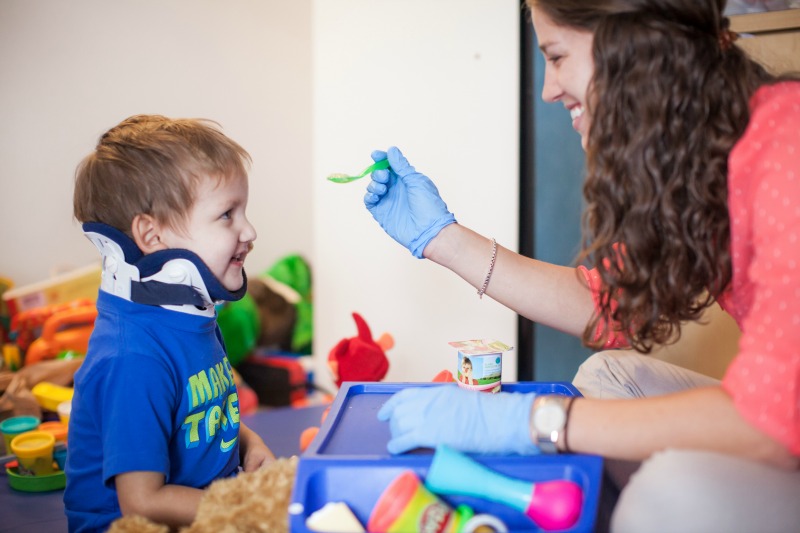Professional Support for Food Aversion Therapy Long Island
Wiki Article
Navigating the Course to Effective Feeding: Cutting-edge Approaches and Interventions for Effective Feeding Therapy
Are you battling to find effective methods and treatments for successful feeding treatment? Look no more. This short article will direct you via the path to success, giving ingenious strategies to examine feeding difficulties and set achievable objectives. With evidence-based approaches, you'll learn exactly how to deal with sensory handling problems and make use of assistive technology and adaptive tools. And also, we'll reveal you the relevance of working together with households and caretakers for optimal feeding results. Obtain ready to navigate the path to successful feeding!Assessing Feeding Challenges and Recognizing Goals
You should start by assessing your child's feeding challenges and recognizing particular goals for their therapy. It's crucial to interact these objectives with your child's feeding specialist so they can customize the therapy sessions to address these details difficulties. By analyzing your kid's feeding obstacles and setting objectives, you are taking the initial action towards helping them establish successful feeding skills.Implementing Evidence-Based Techniques for Feeding Treatment
Applying evidence-based strategies for feeding therapy can result in positive results for youngsters. You are making sure that the treatments used are sustained by clinical research and have actually been verified effective when you integrate these methods right into your youngster's therapy plan. This approach raises the possibility of success and aids deal with the details feeding obstacles your kid might be experiencing.By complying with evidence-based strategies, you can provide your kid with the very best possible care and assistance. These approaches might consist of utilizing a variety of sensory experiences during nourishments, such as checking out different textures and flavors, to urge approval of brand-new foods. Furthermore, carrying out habits adjustment methods can assist address picky eating habits and advertise much healthier consuming patterns.
One more vital facet of evidence-based feeding therapy is entailing the household in the treatment procedure. By giving education and support to caretakers and parents, they can play an energetic role in assisting their kid get rid of feeding obstacles. This collective approach enhances the performance of treatment and promotes long lasting favorable adjustments in your youngster's eating behaviors.

Addressing Sensory Processing Issues in Feeding Therapy
Resolving sensory processing concerns in feeding therapy can be challenging, yet it is essential for promoting a positive eating experience for youngsters. When you encounter a youngster with sensory handling problems during mealtime, it is necessary to recognize that their responses to specific structures, tastes, smells, or also audios are not willful (feeding therapy long island). By recognizing and resolving these problems, you can help develop an encouraging atmosphere that encourages healthy and balanced eating habits
This approach allows the kid to come to be familiar with the food and its sensory buildings at their very own speed. In addition, offering a variety of flavors and textures can aid desensitize their sensory system and broaden their food preferences.
Engaging the child in sensory play activities can also be advantageous. Urge them to explore different appearances, such as squishing, squeezing, or touching numerous food items. This can assist stabilize sensory input and reduce aversions to certain structures.
An additional important facet is providing a structured and tranquil eating environment. Reduce distractions, such as bright lights or loud sounds, which can bewilder their senses and hinder their capability to concentrate on eating. Developing a predictable routine and using visual routines can also assist the kid feel more safe and secure and in control during nourishment.

Using Assistive Modern Technology and Adaptive Devices
Utilizing assistive technology and flexible tools can substantially boost the feeding experience for kids with sensory processing difficulties. Mealtime can be overwhelming and tough when you have difficulty with sensory handling. But with the right devices, you can make it an extra successful and pleasurable experience.One alternative is utilizing specialized tools and plates created to suit your requirements. These tools might have textured manages or a larger hold, making them easier to manipulate and hold. Plates with split areas can aid separate different foods and stop them from touching, which can be a source of pain for some youngsters.
In addition to specialized utensils and plates, there are also assistive tools that can be used throughout feeding. As an example, a weighted vest or lap pad can give deep pressure input, aiding to soothe and regulate your sensory system. A shaking tooth brush or chewable jewelry can give dental sensory excitement, making the act of consuming extra satisfying.
Modern technology can also play a role in improving the feeding experience. There are devices and applications readily available that can give aesthetic or auditory cues, such as timers or motivates, to assist you stay focused and organized throughout mealtime.
Working Together With Households and Caretakers for Successful Feeding Outcomes
When teaming up with caretakers and family members, you can interact to create a helpful and nurturing environment for effective feeding end results. By entailing family members and caretakers in the feeding treatment process, you can acquire important insights into the child's feeding challenges, practices, and preferences. food aversion therapy long island. This cooperation permits an alternative approach to feeding therapy, addressing not only the physical aspects but additionally the psychological and mental variables that might influence a youngster's feeding abilitiesOne secret element of teaming up with caregivers and family members is giving education and learning and training. By furnishing them with knowledge and skills, they can proactively take part in the feeding therapy process and support the youngster's progression beyond therapy sessions. This can include instructing them feeding techniques, techniques for managing mealtime actions, and comprehending the significance of uniformity and routine in developing healthy and balanced consuming behaviors.
Furthermore, involving family members and caregivers in setting goal and therapy planning makes sure that their perspectives and goals for the youngster are taken right into consideration. By functioning with each other, click for more you can develop sensible and achievable goals that line up with the family members's values and concerns - feeding therapy long island. This collective technique cultivates a sense of here are the findings possession and empowerment, creating a solid foundation for effective feeding outcomes
Additionally, open and regular communication with households and caregivers is crucial for efficient cooperation. By preserving ongoing dialogue, you can resolve concerns, offer support, and make essential adjustments to the feeding therapy strategy as needed. This communication also permits sharing progress updates, commemorating success, and determining any kind of obstacles or barriers that may develop.

Final Thought
Congratulations on finishing this write-up on navigating the path to effective feeding! You have actually explored different methods and treatments for effective feeding therapy, such as examining difficulties, carrying out evidence-based techniques, resolving sensory processing concerns, and using assistive modern technology. By working together with family members and caretakers, you can make certain effective feeding results. Bear in mind to always remain cutting-edge and proactive in your technique to feeding therapy. Keep up the fantastic job!It's crucial to communicate these objectives with your youngster's feeding therapist so they can customize the therapy sessions to resolve these particular challenges.Implementing evidence-based methods for feeding therapy can lead to favorable results for youngsters.Attending to sensory handling problems in feeding treatment can be tough, however it is important for advertising a favorable consuming experience for children. By entailing families and caretakers in the feeding treatment procedure, you can gain valuable insights into the child's feeding practices, choices, and difficulties. By furnishing them with understanding and skills, they can proactively get involved in the feeding treatment process and support the child's progression outside of treatment view it now sessions.
Report this wiki page